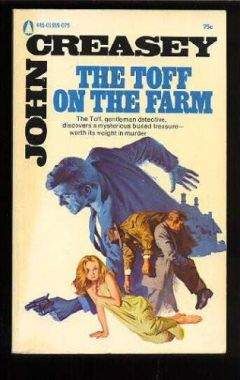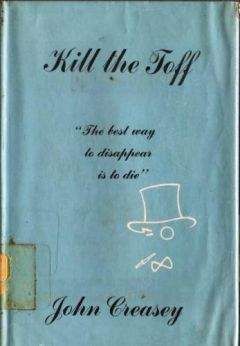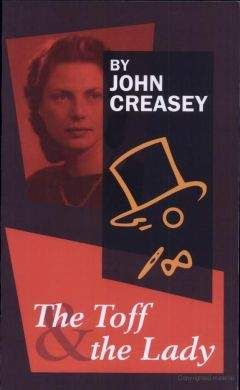John Creasey - The Toff and The Sleepy Cowboy

Обзор книги John Creasey - The Toff and The Sleepy Cowboy
JOHN CREASEY
The Toff and The Sleepy Cowboy
Copyright Note
This e-book was created by papachanjo, with the purpose of providing a digitized format of the books written by John Creasey without the least intention of commercial gain of any sort. This e-book should hence be utilized for reading only and if you like it and can buy it, please do to support the publishers.
This book was scanned by a friend in America along with others.
I am trying to create at least an ample collection of all the John Creasey books which are in the excess of 500 novels. Having read and possess just a meager 10 of his books does not qualify me to be a fan but the 10 I read were enough for me to rake up some effort to scan and create these e-books.
If you happen to have any John Creasey book and would like to add to the free online collection which I’m hoping to bring together, you can do the following:
Scan the book in greyscale
Save as djvu — use the free DJVU SOLO software to compress the images
Send it to my e-mail: [email protected]
I’ll do the rest and will add a note of credit in the finished document.
from back cover
When an outbreak of small-shop robberies culminates in vicious murder, Superintendent West becomes convinced that an organised gang is at work—one whose leaders will stop at nothing in order to safeguard themselves.
Can he convince his superiors, and intervene effectively before more lives are lost?
Can he restrain a man intent on revenge, whose wife and unborn child have perished at the hands of the killers?
More violence is to follow, and West himself is to run grave risk before the amazing truth is revealed.
Table of Contents
Copyright Note
1
2
3
4
5
6
7
8
9
10
11
12
13
14
15
16
17
18
19
20
I
The Man Who Did Not Move
OUT OF THE WARM skies of Arizona in the American great south-west came a huge aircraft; it flew over high mountains and wide rivers and huge lakes, over deep valleys where little grew, and over the lush green of the eastern states until it landed at New York’s Kennedy Airport, after flying over sea and houses, beaches and man-made lagoons.
All of this took some five hours.
Some of the passengers were tense and apprehensive before the wheels touched down, others were so used to air travel that they chafed only at the need to keep their seat belts fastened. The tension and the impatience vanished as the great machine taxied towards the gate which would lead its passengers to the airport building. The stewardesses pleaded for them to keep their seats until the aircraft stopped, and all did. But as the motion ceased it seemed as if every man and woman present leapt up, grabbed coats and hats and bags and tried to get into the gangway first.
In fact, a few, the wise ones, stayed in their seats, knowing that all would have to wait together until the baggage was brought from the bowels of the aircraft and placed on a slow-moving conveyor belt for passengers or porters to pluck it off. Fewer, elderly or infirm, waited until the crush was over and stewardesses and kindly fellow-passengers could help.
At last, only one passenger remained in his seat: a man.
He sat upright, his seat belt still fastened, but his chin nestled on his chest.
He appeared to be asleep; certainly he did not move.
For the steward and the stewardesses it had been a trying flight, for bumpiness over the great plains had made some passengers sick and others bad-tempered. The young man who did not move, however, had been a model passenger, hardly seen and seldom heard, and obediently keeping his seat belt fastened during the turbulence. Perhaps that was why he had been overlooked. Two stewardesses, coming from the front of the aircraft, neat-looking, nice-looking, picking up some odds and ends of equipment and magazines from the seats, saw him at the same moment.
“For heavens sakes,” exclaimed one, a brunette. “Some people can sleep through an earthquake,” remarked the other, who was a vivid blonde.
The brunette leaned across and touched the young man’s arm.
“Excuse me,” she said, “but we’re in New York.” The young man did not respond in any way.
“Sir, we’re in New York.” The girl’s voice rose. “We’re at Kennedy!” called the fair one, as if that announcement was enough to awaken the dead.
Still the young man did not stir.
“Betty —” the dark-haired girl began.
“Pauline —” began the other.
“You don’t think —”
“He can’t be!”
Suddenly, these two young women, used to every conceivable emergency in the air, were alarmed. The fair-haired one, also the prettier, went behind the passenger, gripped his shoulders and shook him, but had no effect at all.
“Wake up!” she cried in desperation.
At the front exit two or three men and another stewardess had gathered, laughing and joking as crews often do at the end of a flight. One man, tall, good-looking, peaked cap on the back of his head, noticed the two stewardesses’ concern and came along the gangway towards them. He was the captain, and technically responsible for what happened until the machine was handed over to the maintenance men for its check.
“Hi, there,” he called, half-way from the exit to the girls. “What’s going on?”
One girl turned to look at him, the other had only to raise her head. The dark-haired one answered.
“This passenger won’t wake up.”
“The flight must have exhausted him,” quipped the pilot. “Let me try.” He squeezed into the row of seats in front of the sleeping man and tilted his head backwards to reveal a long, bony face, a long, spade of a chin, a high forehead, a long nose with nostrils which had a distended look — and eyelids drawn, tight as shutters, over the large eyes.
It was an unusual face; the kind one did not easily forget.
The skin was tanned deeper than gold. The hair was cut short, making a kind of halo so fair it was like the stubble of corn. The pilot held the head up and gripped the man’s shoulder with his free hand, shaking it.
“Hey, there. Wake up, fella!”
The head bobbed under the shaking but there was no other movement.
The pilot’s expression changed, as if a shadow of apprehension fell upon him also, and he glanced from girl to girl. To his credit he did not utter the suspicion which had come into his mind, but looked round and called to the men at the front:
“Hey, fellas! We’ve got a sleeping beauty here. Come and take a look.”
They came . . .
Very soon a doctor arrived from the airport, for crews had to use extreme care when a passenger was unwell, and the certain thing now was that this young man was not simply asleep. He was unconscious, with a sluggish pulse. Strictly speaking, the pilot and the stewardesses could have gone off duty, after they had made their reports, but none of them did. Instead, as the passenger was wheeled on a surgical trolley away from the aircraft and by devious routes to the hospital —devious to make sure no other passenger saw him — the captain said:
“Come on girls, I’ll buy you a dinner. When we’re through we should know what’s going on.”
“Do you — do you think he’s dead?” asked the brunette.
“Could it be something he ate on the aircraft?” asked the fair girl, fearfully.
“What a thing to say before dinner,” protested the pilot. He put an arm about each girl and led the way towards the restaurant. “Come on, forget it! He looked good and healthy to me.”
As they entered the restaurant, with its soft lights and sparkling cutlery, and the manageress led them to a table for four, a doctor was touching the eyelids of the man who seemed to be asleep. This ‘hospital’ was really a first aid room but contained everything needed for emergency, including another doctor; for they had overlapped on their duty rota. The younger doctor saw that the pupils were pin points. He waited for the other, older man, who took one look and said:
“Morphia.”
“It looks like it?”
“S elf-administered ?”
“It could be.”
“Do we know how long he’s been out?”
“No, we don’t.”
“The only way to find out would be to question the crew and the passengers,” the older man said. He was tired-looking, grey-haired, scraggy.
“If it’s that important,” remarked the younger man, who went on: “I’ll go and find out if the passengers are still at the baggage claim. If they are we can put a temporary hold on them there until the police arrive.”
“I’ll call the police,” the older man volunteered.
He meant, of course, the airport police, who would call the Long Island force if that seemed necessary. The younger man went off. He knew from experience that the best way to check the baggage claim was to see with his own eyes, telephone questions too often received inconclusive and vague answers. This was one of the smaller airport buildings, shared by several airlines, and the baggage was all brought to the conveyors and separated by porters under different flight numbers.
Three people stood by a nearly empty conveyor, above which was an illuminated sign reading: Flight 212 from Tucson. A grey-haired porter, red cap set at a rakish angle, came and asked:
“Can I help you, doc?”
“Is this all that’s left from Flight 212?”
“Sure is — these three are all that’s left.”
“Thanks,” the doctor said, ruefully.
“There any trouble, doc?”
“There’s a sick man,” the doctor answered, “If that’s trouble.”
“It’s trouble for someone,” the red cap answered, and his wrinkled face and his dark eyes had a tinge of sadness. “You suppose anyone’s come to meet the sick person, doc?”
“If they have they may be able to help us,” replied the doctor.
But no one had come to meet the man, and after many inquiries and some three hours after the aircraft had landed, a sergeant from the Long Island Homicide Squad and the man in charge of security at the airport, the young doctor and the pilot, met in a room leading off the hospital. Each had a copy of the typewritten report, prepared by the Security Officer after checking with everyone concerned and after going through the passenger’s pockets.
It was remarkably comprehensive :
Passenger’s name: Thomas G. Loman
Age: 28
Passport: U.S.A.
Condition: Unconscious from morphine poisoning
Period of unconsciousness: Estimated at one hour after removal from aircraft
Physical condition: Excellent
Operation or accident scars: None
Eyes: Blue
Complexion: Fair
Hair: Yellow
Possessions in pockets: Keys; coins; wallet containing $1,001.1; passport
Travellers cheques: $5,000
Destination: London, England
Continuation flight (shown on ticket): B.O.A.C. 505 22.30 from Kennedy
Baggage in hold (on ticket): None
Hand Baggage: None
Given address in London (on ticket): c/o Richard Rollison, 25g Gresham Terrace, W.1
Other particulars: Suspected needle puncture, right forearm. No other punctures.
All the men in the office read this carefully, the Security Officer finishing first. He looked at the others and when the pilot’s eyes were raised from the paper, said in a deep voice :
“It sure looks as if the guy was given a shot on the aircraft which put him out.”
“But it could have been taken orally,” argued the young doctor.
“Or been self-administered,” put in the pilot.
“There is no sign of a hypodermic needle in his pockets,” stated the Security Officer.
“There might be a disposable hypo in the garbage,” contributed the young doctor, eagerly.
“Not in the garbage of Flight 212,” replied the Security Officer. “We checked. We can double check, though, we kept the garbage stored, there was good time for that.”
“Nice work, Joe,” approved the man from Homicide. “What’s this about no hand baggage?”
“No hand baggage,” stated the Security Officer with assurance he showed in every utterance.
“Did he bring any on board?” inquired the man from Homicide.
This police officer was rather small, plump and pink; he looked less like a New York policeman than anyone present. He was dressed in a well-cut suit and had only one mannerism: raising his right eyebrow from time to time, either speculatively or because he had a twitch. His dark hair was smoothed over his cranium so that streaks of white pate showed through, and the parting was incongruously close to his right ear. Everything about him suggested a man of great personal carefulness; even his hands, the nails of which were manicured although not a particularly good shape.
“He had one small bag,” answered the captain.
“Don’t they search hand baggage in Tucson?” asked Homicide.
“They search it these days,” answered the pilot, “but they don’t make out a schedule, Sergeant. If a man’s clean of weapons or smuggled goods, he’s clean. All these passengers were clean. There was one guy with something in his case which ticked like a bomb but it was his alarm clock, he never trusts hotel clerks to wake him. One guy and a woman had guns, and these were taken away so they had to pick them up at the baggage claim.”
“They picked them up,” the Security Officer remarked. “From me. They were both in order.”
There was a lull in the questions and answers before the pilot asked:
“Did he have baggage checks?”
“Two,” agreed the Security Officer.
“So where are his bags?”
“Someone collected them for him.”
“Without the claim checks,” remarked Homicide. “You know how it is,” said Security wearily. “You pick on one in a dozen to see their check and the one on the baggage they are taking out are the same. We don’t have any trouble.”
“This,” remarked Homicide, heavily, “is trouble. The passenger seems to have been robbed on the aircraft and his baggage taken away from the baggage claim without a claim check. If the guy wants to sue the airline I guess he’s got a million dollar case. Joe, what about the passengers on either side of this guy? A passenger on his right could have given him a shot. Or one of the stewardesses. Or —”
“Or anyone passing along the gangway and leaning over for a magazine or, as I told you, it could have been self-administered. We’re trying to trace the man who sat on his right but it’s not easy — people changed seats a lot, the aircraft wasn’t full. The question is, do we ask for details about the guy from Tucson or do we wait until Mr. Thomas G. Loman comes round?”
Now, all eyes were on the man from Homicide, who leaned back in his chair and looked at the young doctor. “How long will he be under, Doc?”
“There’s no way of being sure, it depends on the strength of the shot and the body’s reaction to it. Some systems run it out fast, others hold it for a long time. He’s been under for more than four hours, now. He might begin to come round at any time.”




